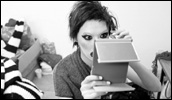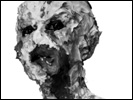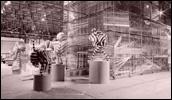Pyuupiru 2001 – 2008
- Year
- 2009
- Original title
- Pyuupiru
- Japanese title
- ピュ〜ぴる
- Director
- Cast
- Running time
- 91 minutes
- Published
- 28 February 2010



by Tom Mes
The opening scene of Daishi Matsunaga's documentary is all it takes for the viewer to realise that they are watching something great. We see the face of a young woman, sitting in the makeup chair. A close-up of the crude sketch for the makeup design. A male voice saying he drew the sketch 'myself'. Then the final photograph of the young woman in an exaggerated sort of clown makeup. The title of the photograph starts with the words 'Self-portrait...'.
Pyuupiru is the Japanese visual artist who started out designing wild, handmade costumes that distorted his tall but frail frame. More recently his attention grabbing photographs that chronicle his physical metamorphosis - sometimes hidden beneath vast amounts of cosmetics, wigs, and masks, but just as often naked and confrontational - have graced the walls of many a gallery and the covers of many an art magazine.
Pyuupiru 2001 - 2008 portrays, as its title suggests, the evolution of an artist, in his work as well in his very being: the transformation from an aspiring amateur into a true creator; from a young man who is "different" (from his parents, his neighbours) into a creature (in all senses of the word) who is unique, neither male nor female, yet also both at the same time - Pyuupiru is at once creation and creator.
As confrontational as Pyuupiru's autobiographical work can be, Matsunaga's film avoids mondo-style voyeurism. Pyuupiru goes through all the expected radical surgical procedures in his gradual metamorphosis, but Matsunaga's camera remains discreet. The director has other ways to convey his protagonist's journey, and they are the ways of a true filmmaker. The strength of his approach is felt in the film's overture: the opening scene that robs us as viewers of all our certainties, that makes us doubt our convictions about what is a man and what is a woman. The "end" result (there is of course no end) of Pyuupiru's transformation is shown only four minutes into the film: a ravishing, self-confident presence staring defiantly into a photographer's lens, after which we flash back to 2001, to a soft-spoken, shy boy with a hint of stubble on his chin, who covers his mouth when he smiles into Matsunaga's DV-cam and wonders what he is 'supposed to do' as the subject of a documentary. 'I wish I had a boyfriend', he sighs. He will utter the same words again toward the end of the film, now seven years older. In between he will have had a relationship with a straight man that was never consummated, not even with a single kiss. Matsunaga's intimate portrait spares us the judgment of others, but we understand what loneliness Pyuupiru must have endured - and been prepared to endure - in order to be himself and, eventually, herself.
It is evident that Matsunaga cares deeply for his subject, who is also his friend. His portrait is non-judgmental and loving, intimate and patient, yet with enough curiosity to allow the outsider viewer to follow, fascinated by this creature who is like none of us at first sight, but like all of us in the end - or least like anyone who has ever felt ostracised or struggled to live their own life against the odds.
This lack of judgment of the "other", the non-exploitativeness of patient observation, watching and listening, Matsunaga shares with a handful of other independent young documentarians, notably Makoto Sasaki, director of Fragment - the portrait of zen monk, actor and TV personality Jicchoku Inoue, who enters ritual fasting before heading to Ground Zero in New York to pray for the souls that perished in the attack on the World Trade Center. Even more impressive than Fragment, and closer to the realm of Matsunaga's film, is Sasaki's short 2 or 3 Examples About Minorities and Sex (2007, part of the otherwise so-so omnibus Naked over8), about the love life of a man who suffers from arthrogryposis.
Films like these form vital beacons at a time when the ostensible everything-goes attitude of our postmodern media landscape is only a thin veil that covers a regressive 'Us vs. Them' attitude. When Pyuupiru builds a sculpture of paper to protest against the invasion of Iraq, for a moment we feel tempted to see his effeminate demeanour and artistic dallying as trivial in comparison to something as tragic as war. But then we realise that Pyuupiru's search for personal happiness is purer and infinitely more laudable, admirable even, than throwing bombs at your neighbour.